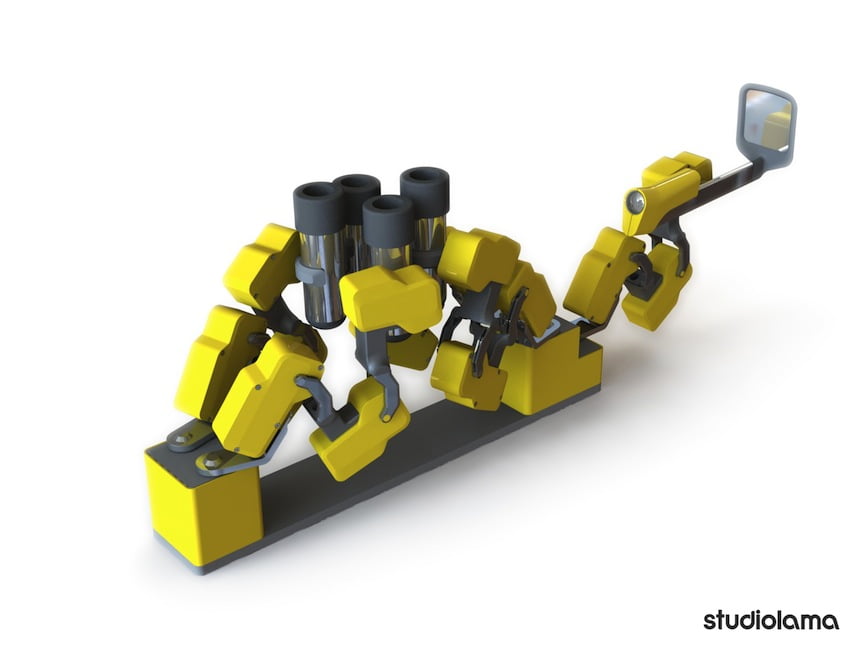Israeli cows lead the world in milk production, and Israeli dairy companies have set up projects in far-flung places like Argentina and Vietnam to export Israeli know-how on feeding, milking, and raising cows. For many farmers in the developing world, Israeli know-how has fostered a revolution in milk production, enabling dairy farmers to triple or quadruple their output. Now, agritech start-up MiRobot is ready to bring the world the next big Israeli dairy farm innovation — a robot that will completely automate milk production, at a far lower cost than anything else available.
“Automated milking systems that are on the market are not really appropriate for large dairy farms,” MiRobot’s CFO David Rubin told The Times of Israel. “The robots that are available can only handle about 70 cows a day — considered small in the dairy business — and they cost between $150,000 and $200,000. But for large farms, where there are 3,000 cows at 100 milking stations, the automation is spottier, and you need a staff to connect the cows to the milking equipment.”
Related articles
- How Israel Became The World Leader In Milking Technologies
- Cattlesense Develops Smart GPS Collars To Keep Track Of Cow Herds
That costs money, and those costs are passed on to the consumers, said Rubin. The dairy business is one of low margins and profits, and in order to maximize income, farmers will try to maximize output, running the farms 24 hours a day and adding more cows. “But there’s a limit to cow productivity, and even if you try to get milk out of cow more often you still have to pay staff to do the work,” said Rubin — and that’s providing you can even find the needed workers. Especially in Western countries, finding workers willing to wade through the muck of a milking stall and physically attach a cow’s teat to a milking machine isn’t easy.
Better results for less
That’s why the idea of a robot for large farms — one that can handle hundreds of cows quickly and efficiently — makes sense, said Rubin, and the MiRobot system enables farmers to make sure their cows are “covered” any time of day or not – automatically, without the need for human workers to prepare the cow for milking. “The robot does all the tasks involved in getting the cow to the milking machine, whether it’s cleaning the milking mechanism, attaching cups to the teats, or ensuring that the milking mechanism is secure.” MiRobot’s system is a lot cheaper, too; on a cost per milking basis for the 8-10 years the system can be expected to last, the system will save farmers significant amounts of money.
MiRobot is set to cost only $12,000 — far less than the cost of any milking robot system — so obviously there must be differences between the system and other robots. Rubin said that the system sacrifices exacting accuracy, with parts and algorithms approximating the areas that the robot arms have to target in order to get the work done. But that’s fine for a milking station, said Rubin. “We are not talking about a machine shop, where a variation of a tenth of millimeter is going to throw off the entire manufacturing process. The cow’s teat — and the cow itself — is large enough that if the cup is positioned a few millimeters to the left or right, the milking process will be able to continue without a problem.”
Instead of working on precise actions, MiRobot’s main technology boost is in its patented imaging system, which directs the robot to the right area that it needs to target. Thus, when a cow walks into the milking stall, the robot, which is stationary, will sort of wrap its arms around the teat, attaching an already cleaned cup and proceeding with the milking operation (the cow is meanwhile busy eating, so it doesn’t mind that it’s being manipulated). If the cow does get upset, though, it won’t be able to do too much damage to the robot, as it is made of flexible plastics, rubber, and other material that will bounce right back if a cow (they’re usually pretty hefty) steps on it or kicks it.
MiRobot is an early stage firm, a part of the Trendlines Group Mofet accelerator, where it is working on getting funding to complete its prototype (Rubin said that the company will be ready for a working demo at a farm in Israel by the end of the year). The company will be traveling to the US at the end of the month to raise money from investors, as part of a roadshow sponsored by Trendlines. The company has already raised about a half million dollars, and is seeking several million more to go into full production.
…
To continue reading this article, click here.
Via The Times of Israel
Photo: Courtesy
Related posts

Resilient And Nutritious New Plant-Based Milk Aims To Make A Splash

Chocolate From Cultivated Cocoa Comes Without Environmental Toll

Plastic Fantastic: Startup Takes PVC Back To Its Crude Oil Roots




Facebook comments